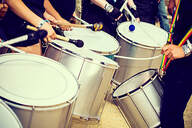|
All the news from Musical Futures International
|
|
Our spotlight series explores the musical stories and experiences that bring people to music and what it is that inspires a lifelong love of music and the drive to share that through teaching music to others. In this article Ollie Tunmer shares some of the methodology that he uses when delivering his popular workshops that are inspired by music from around the world!  Ollie is Director of Beat Goes On which delivers school workshops, PD sessions and conference content worldwide. Their team of highly experienced facilitators include former cast members of STOMP and performers in the Rio de Janeiro carnival. Teaching rhythms from around the worldAt Beat Goes On we have the privilege of delivering STOMP-style Body Percussion and Afro-Brazilian Percussion workshops in schools, PD events and conferences internationally. We’re lucky that what we do is naturally fun, loud, exciting and highly accessible, meaning that a sense of accomplishment can be achieved quickly! Maintaining this, however, requires some clear methodology. I find that as a musician, if I have a verbal phrase that sounds like the rhythm I’m trying to learn, the rhythm becomes more memorable. As a workshop facilitator, if you involve the key-words of a project, then participants will end up repeating the key-words using the rhythm that they’re learning. For example, when teaching an ‘agogo’ bell rhythm from the Afro-Brazilian ‘maracatu’ style, we use the following – We refer to these as ‘rhythmonics’ (rhythms and mnemonics), and find them indispensable, both as a teaching / learning aid and as a compositional tool. In our longer term samba projects, pupils learn several rhythms, instrument names, compose their own samba ‘breaks’ and deepen their learning of Brazilian culture using this approach – quite an achievement! 3 - that's the magic numberWhen teaching rhythms we use a three step process:
This process allows learners to internalise the rhythm first, without being put off by instruments being played. We often use just the first two of these steps in our body percussion sessions, and then explore how movement / choreography can be developed, to make the rhythms look as good as they sound! Roles within the 'world' music ensembleEnsemble music making can provide a platform for the development of other, non-music specific skills. The ‘mestre’ and ‘director’ (leaders) of a samba ‘bateria' have to develop communication and leadership skills. Training young people in this area can empower them to take ownership of their learning. Similarly, a ‘surdo’ (bass drum) player may be required to play a pulse-based rhythm which, although simple, is of huge importance to the overall sound of the band, providing a sense of responsibility for the student involved. As well as teaching rhythms from other cultures, a fun and high impact route can be to incorporate participants’ own musical experiences and interests, taking a leaf from the Musical Futures book. At MF Australia’s ‘The Big Gig’ 2018 in Melbourne, some participants expressed a mutual liking for drum’n’bass, which we duly orchestrated into the samba band context! Words and RhythmsOne element that often provokes interest is the linking of music with other curriculum areas. We’ve proudly been working with literacy guru Pie Corbett of Talk4Writing, taking his ingenious storytelling and poetry methods down a body percussion route – high energy, creative fun for all involved, with astounding results! 'Working with Beat Goes On is an extraordinary experience and I would recommend them to any school. We have used body percussion to let the rhythms and meanings of poems and stories fly. Exploring story/poetry through the arts, deepens imaginative engagement and makes language memorable.’ - Pie Corbett Feedback from all of these approaches is unanimously positive – they cover the full range of learning styles allowing all participants to access material and develop their own ideas in new, creative ways. Find out moreFor more information and free downloadable resources for teaching rhythms inspired by music from around the world, visit www.beatgoeson.co.uk , contact info@beatgoeson.co.uk and follow @BeatGoesOnUK
0 Comments
|
AuthorWrite something about yourself. No need to be fancy, just an overview. Archives
August 2023
Categories |
